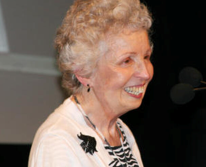
Geraldine Jonçich Clifford
Professor of Education, emerita
Geraldine Jonçich Clifford, a distinguished professor of education and a specialist in the history of education, died on September 12, 2024, after a short illness.
Professor Clifford was a California native who attended her local public schools before graduating Phi Beta Kappa from UCLA. She completed a doctorate in the history of education at Columbia University in 1961, where she studied with the educational historian Lawrence A. Cremin. She joined the Berkeley faculty in 1962, teaching courses in the social foundations of education—courses she saw as illuminating the social, political, religious, cultural, and educational controversies and conflicts that have permeated public education throughout its history. As a teacher, she was known for the care she devoted to preparing lectures for her undergraduate classes and for the incisive and thoughtful feedback she gave to graduate students. A former graduate student described her this way: “Feisty, gutsy, determined, independent, assertive, confident. I always learned something from a conversation with Geraldine—a different perspective on a topic, a sharper way of analyzing an issue.”
While still pre-tenure, Professor Clifford was one of 25 Berkeley faculty members in 1965 (and one of just two women) to be awarded a Guggenheim Fellowship in recognition of their “highest capacity for scholarly and scientific research.” That award led to the publication of her first book, a biography of the American psychologist Edward L. Thorndike, who laid the foundations for the field of education psychology (The Sane Positivist: A Biography of Edward L. Thorndike, Wesleyan University Press, 1968). She was among the first women to achieve tenure in her department and went on to serve as acting department chair and acting dean at a time when the School of Education was under threat of closure in the early 1980s. She was a fierce defender of the School and, more broadly, the place of schools of education in research universities. Ed School: A Brief for Professional Education (co-authored with colleague James W. Guthrie) details the challenges that schools of education face in universities that often prize theoretical contributions over practical accomplishments. The schools of education at Berkeley, UCLA, Stanford, Michigan, Columbia, Chicago, and Harvard figure prominently in the book, illuminating the historical tensions between the academic and the vocational and how those tensions play out in prominent institutions with distinctive institutional cultures.
Much of Professor Clifford’s writing focused on the place of women in higher education and on the social history of American women teachers, and it was for that major strand of her work that she was twice recognized by the American Educational Research Association. When she won the Willystine Goodsell Award in 1992, the press release spoke of Professor Clifford’s work as “transforming the field,” and quoted the historian David Tyack in saying that her work had become “a point of departure for much of the best scholarship of the coming generation of educational historians.” In 2013, long after she had retired, she received the Distinguished Contributions to Gender Equity in Education Research Award for her career-long contributions to historical research on the lives of women teachers.
Professor Clifford’s final book Those Good Gertrudes: A Social History of Women Teachers in America—in progress in 1992—was testimony to her exhaustive and meticulous archival research and required winnowing a 1000-page manuscript down to just under 600 before its publication by Johns Hopkins University Press in 2014. (Characteristically, she rued the loss of entire chapters and the many supporting details and examples culled from hours spent perusing letters, diaries, and records.) The image of a Gertrude derives from the writings of Swiss educator Johann Pestalozzi (1746-1827), embodying his idea of what a good teacher should be: as Professor Clifford put it, the antithesis of the stern schoolmaster wielding a rod. One review, published in the journal Teachers College Record, called the book "an encyclopedic research trove” that “powerfully illuminates” the lives and perspectives of women engaged in a life of teaching. When UC Berkeley launched an initiative in 2020 to celebrate the 150 years since women were first admitted to the University as students, the organizers of that initiative looked in part to Professor Clifford’s earlier book “Equally in View:” The University of California, its Women and the Schools.
Professor Clifford retired in 1994 but continued her scholarly work as Professor of the Graduate School. At this time, her colleague James W. Guthrie praised Professor Clifford both for her incisive scholarship and for her devotion to teaching and service, crediting her with devoting “thousands of hours” of service to the Berkeley campus, the Academic Senate, and the Graduate School of Education. Over more than 30 years on the faculty, she served on multiple Academic Senate committees, including Graduate Council, Privilege & Tenure, and the Committee on Committees. Prior to her retirement, she served as Director of the UC Education Abroad Program in Australia and New Zealand for two years in 1988 and 1989. Following her retirement, she served as a member of Emeriti Relations and on the Panel of Counselors. Professor Clifford also took on leadership roles in the broader field of education scholarship, mentoring generations of young scholars and serving in leadership roles for the American Educational Research Association and the History of Education Society, on the editorial board of the leading journal in her field, the History of Education Quarterly, and as a reviewer for many journals and for the National Endowment for the Humanities.
Geraldine Clifford was pre-deceased by her husband William F. Clifford, Jr. and is survived by her stepdaughter Robin Suarez and husband Kenneth, stepson Patrick W. Clifford Hancock, step-grandson Paul Suarez and wife Quyen, great-grandsons Samuel and Louis Suarez, nephew Shawn Athen and wife Laura.
Judith Warren Little
